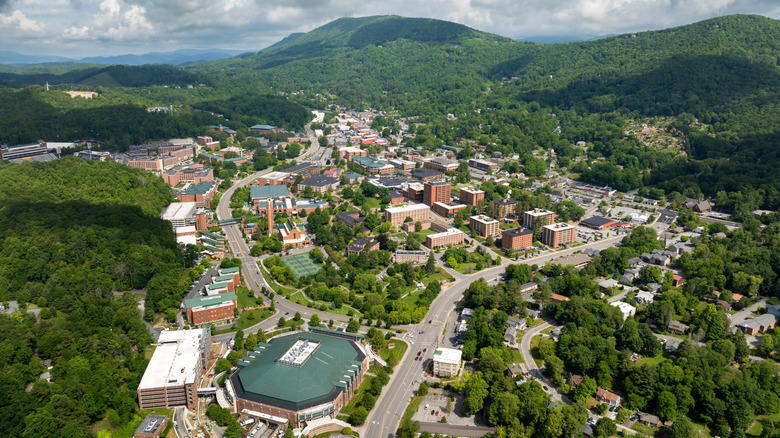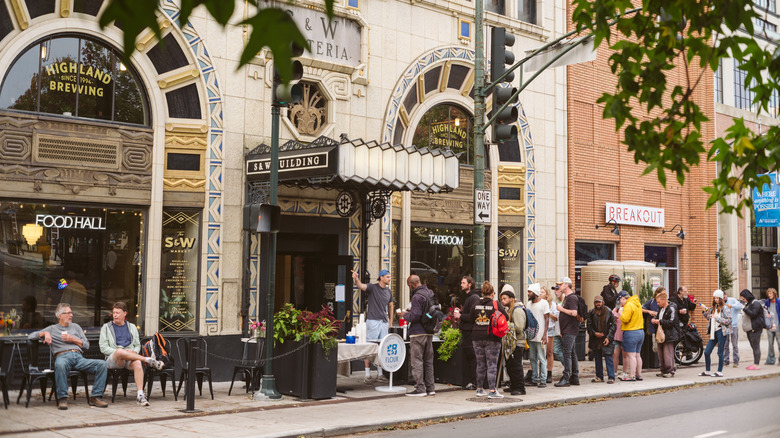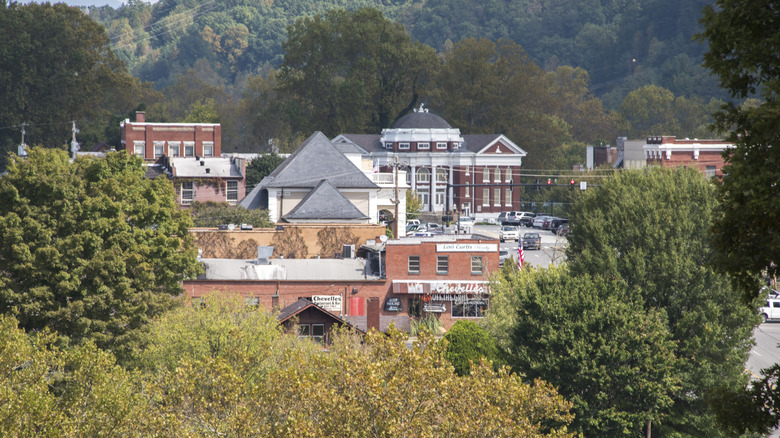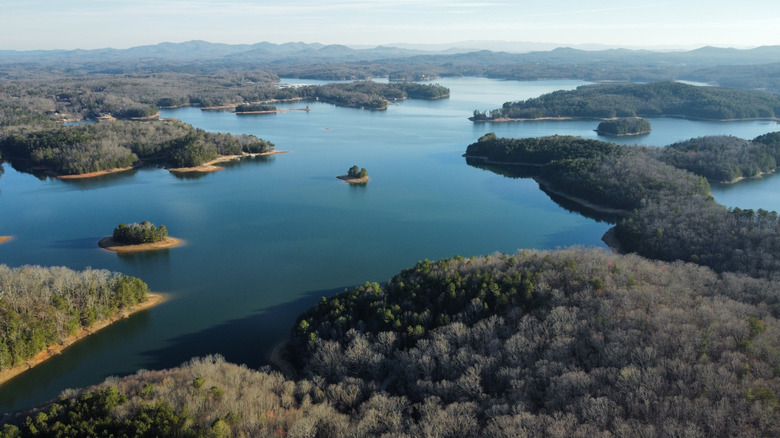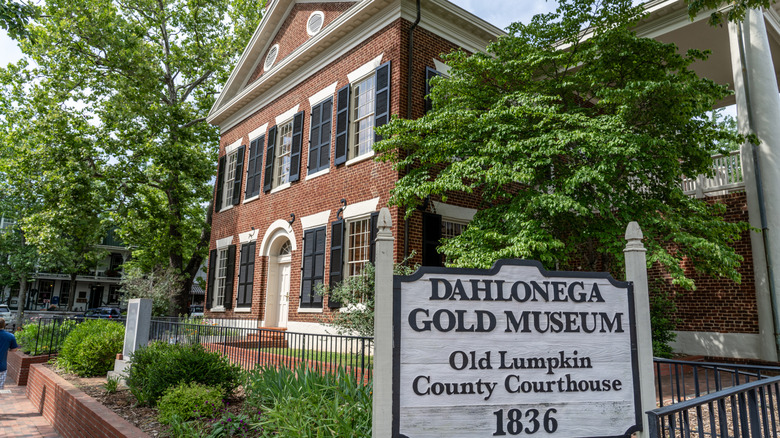Breathtaking Blue Ridge Mountain Destinations To Retire In With Just A Social Security Check
As one gets older, retirement starts to become the main focus. For those 55 and up, saving up for retirement is a crucial step, but one other element is where to live. Many retirees choose to downsize and move once they stop working, but picking the right location can make or break one's golden years. For example, some may want to choose an affordable retirement location in the U.S. where they can see all four seasons. Others, however, might want a specific type of scenery, such as the mountains.
The Blue Ridge Mountains in the Eastern United States are incredibly scenic and enjoyable year-round. Best of all, many cities and towns along this mountain range are more affordable than one might think, especially when it comes to retirement. Retirees in the U.S. over 65 have a median annual income of about $56,800 (per Empower), which includes Social Security checks, pensions, assets, and continued employment.
When making this list, we highlighted each place's cost of living for an individual (including housing and daily expenses), while also taking into consideration the city's accessibility for seniors and community feel. Whether you're looking to retire soon or just dreaming of the future, here are five great picks for retiring in the breathtaking Blue Ridge Mountains with just a Social Security check.
Boone, North Carolina
Kicking things off is the artsy North Carolina mountain town of Boone, boasting Asheville vibes without the high prices and heavy crowds. Overall, North Carolina is a fantastic state for retirees because there are no state taxes on Social Security checks, so more of your retirement income stays in your pocket. Plus, the state doesn't impose inheritance or estate taxes, meaning your loved ones receive more money once you're gone.
Boone, in particular, is great for mountain-loving retirees because it has all the trappings of a small town with many amenities of a larger city. Because Boone is something of a tourist hotspot, it has a decent hospital and medical center, as well as a vibrant downtown district. It's also home to Appalachian State University, so it has better infrastructure than other small mountain towns.
The cost of living in Boone (at the time of this writing) is less than 1% higher than the national average, and just over 10% higher than the rest of North Carolina, per Best Places. However, much of those costs are associated with housing, with a median home price of around $418,900. That said, for an individual, Best Places recommends an annual income of $26,400, which is easily doable for most retirees. One point to consider, though, is that Boone gets about 33 inches of snow every year, which can make it harder to maintain a home or active lifestyle during the winter.
Asheville, North Carolina
It's nearly impossible to discuss retiring in the Blue Ridge Mountains without talking about Asheville. The artsy city full of eclectic fun is sandwiched between two mountain ranges and consistently ranks as one of the top retirement cities in the Tar Heel State. That said, Asheville is a bit more crowded and more expensive than other North Carolina cities, so there's a trade-off.
Overall, Best Places reports that the cost of living in Asheville is almost 6% above the national average, and single individuals should make at least $61,600 annually to live comfortably. The median home price isn't that much more than Boone, standing at $428,500 at the time of this writing. But everything else is also slightly more expensive in Asheville, including groceries, transportation, and utilities.
However, being in a bigger city does come with a few perks. First, it's much easier to get around, and there are more places to experience. Because the city straddles the French Broad River, there are artsy districts, tons of great restaurants, and world-class entertainment nearby. For example, the Biltmore Estate is just outside Asheville, hosting elegant events throughout the year. Plus, the city only gets about 11 inches of snow annually, which is much more manageable than other Bue Mountain towns.
Murphy, North Carolina
If you still want to get the benefits of living in North Carolina but want to avoid the big city and heavy snowfall, Murphy might be just the ticket. This charming town is so picturesque that it's been compared to a Norman Rockwell painting, which is ideal for many retirees who want a quiet, simple life next to the mountains. Plus, not only does Murphy straddle a river like Asheville, but its average annual snowfall is just 4 inches.
The cost of living here is also much more affordable than in Boone or Asheville. In fact, according to Best Places, the city ranks about 18% lower than the national average, with a suggested annual income of $25,200 for an individual. Basically, your retirement money goes extra far here, not only because you're not taxed on Social Security but because it's much cheaper to live overall.
Best of all, while Murphy seems small on the map, there's still plenty to do. There is a hospital just eight minutes from the city, and even a Harrah's Casino on the outskirts if you love to gamble. The downtown district is historic and full of charming restaurants and boutiques to occupy your time. Some dining highlights include the Southern-style ShoeBooties Cafe, Cherokee Cellars Taphouse and Grill, or Buck Bald Brewing if you like to sip on freshly brewed draught beer.
Blue Ridge, Georgia
Like North Carolina, Georgia is a tax-friendly state for retirees since it doesn't take taxes from Social Security checks. Similarly, the Peach State doesn't impose inheritance or estate taxes, making it easier to pass assets onto beneficiaries. Finally, the cost of living in Georgia is relatively tame, especially if you stick to the northern part of the state, next to the Blue Ridge Mountains. The city of Blue Ridge itself is one of the South's most renowned mountain cities, thanks to its charming and artsy vibes. Better yet, it's next to a lake, several creeks, and, of course, the mountains.
Although Blue Ridge is something of a resort town, its cost of living is less than 2% higher than the national average at the time of this writing, per Best Places. Home prices are relatively steep, with a median price of $447,700. However, Best Places recommends an annual salary of $26,800 for a single resident, which is still very attainable for most retirees. And, like Murphy, the city only gets about 4 inches of snow annually.
Overall, Blue Ridge is ideal for retirees who love the outdoors and want options depending on the time of the year. During the summer, you can hang out by the lake and enjoy the water. Then, during the winter, you can either stay warm inside or venture out to hike snow-capped peaks or ski down nearby slopes. Plus, Atlanta is just over 90 miles away if you need a taste of the big city.
Dahlonega, Georgia
Our final affordable Blue Ridge retirement locale is the destination-worthy Georgia city rich with wineries, waterfalls, and gold mining. In fact, Dahlonega was founded because of a gold strike in the area. These days, though, the city is perfect for celebrating your golden years, even if you don't find any actual nuggets in the rivers and streams nearby. Dahlonega has become an artsy paradise, far removed from the hustle of the Atlanta Metro area but still close enough to make it convenient.
Despite Dahlonega's glow up in recent years, the city is still cheaper than the national average — about 11% lower at the time of this writing. According to Best Places, a single resident only needs to make $34,800 annually to live comfortably, and the median home price is under $400,000. Even the snowfall is highly manageable at a mere 3 inches per year.
Dahlonega's nearest medical center is 10 minutes from the city, which could be a drawback for some. During your retirement, you can enjoy attractions like the Dahlonega Gold Museum, the Tuscan-style Montaluce Winery and Restaurant, and the stunning scenery of Amicalola Falls, which are just 30 minutes from downtown.

